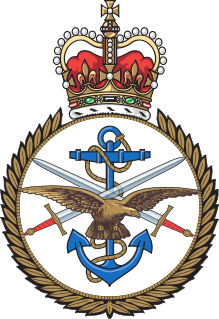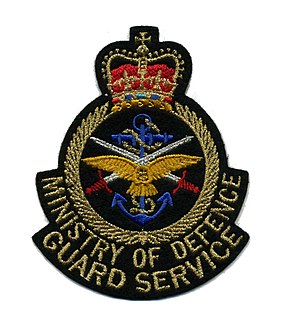
The British Armed Forces, also known as Her Majesty's Armed Forces, are the military services responsible for the defence of the United Kingdom, its overseas territories and the Crown dependencies. They also promote the UK's wider interests, support international peacekeeping efforts and provide humanitarian aid.

The Ministry of Defence is the British government department responsible for implementing the defence policy set by Her Majesty's Government, and is the headquarters of the British Armed Forces.

Defence Intelligence (DI) is an organisation within the United Kingdom intelligence community which focuses on gathering and analysing military intelligence. It differs from the UK's intelligence agencies in that it is an integral part of a government department – the Ministry of Defence (MoD) – rather than a stand-alone organisation. The organisation employs a mixture of civilian and military staff and is funded within the UK's defence budget. The organisation was formerly known as the Defence Intelligence Staff (DIS), but changed its name in 2009.

The Royal Military Police (RMP) is the corps of the British Army responsible for the policing of army service personnel, and for providing a military police presence both in the UK and while service personnel are deployed overseas on operations and exercises. Members of the RMP are often known as 'Redcaps' because of the scarlet covers on their peaked caps and scarlet coloured berets.

The Ministry of Defence Guard Service (MGS) is part of the Defence Infrastructure Organisation of the Ministry of Defence, it provides military establishments across the United Kingdom with guarding and patrol services and was established as a response to the Deal Bombing. The Guard Service is one of the few remaining uniformed Civil Service agencies within the UK, and has been named an elite guarding service within the United Kingdom.

An authorised firearms officer (AFO) is a British police officer who is authorised, and has been trained, to carry and use firearms. The designation is significant because in the United Kingdom most police officers do not routinely carry firearms, although they can be equipped with tasers. The only forces where officers are routinely armed are the Police Service of Northern Ireland, the Ministry of Defence Police, the Civil Nuclear Constabulary, Belfast Harbour Police and the Belfast International Airport Constabulary.
The Special Escort Group or SEG (MDP) are a specialised unit of the Ministry of Defence Police. It is primarily responsible for the movement of all nuclear weapons and Defence Special Nuclear Material within the United Kingdom.

Defence Infrastructure Organisation (DIO) is an operating arm of the Ministry of Defence (MoD) in the United Kingdom, which is responsible for the built and rural estate. Its Chief Executive is Graham Dalton.

The Defence Science and Technology Laboratory (Dstl) is an executive agency of the Ministry of Defence of the United Kingdom. Its stated purpose is "to maximise the impact of science and technology for the defence and security of the UK". The agency is headed by Doug Umbers as its (interim) Chief Executive, with the board being chaired by Adrian Belton. Ministerial responsibility lies with the Minister for Defence Procurement.

Royal Naval Armaments Depot Coulport, shortened to RNAD Coulport, on Loch Long in Argyll, Scotland, is the storage and loading facility for the nuclear warheads of the United Kingdom's Trident programme.
Defence Nuclear Accident Response Organisation (NARO) is maintained by the UK Ministry of Defence (MOD) to respond to an accident or incident, including one arising through terrorist acts, involving defence nuclear assets.
Defence Nuclear Material Transport Operations refer to the movements of military Defence Nuclear Materials (DNM) within, to and from the United Kingdom. Defence Nuclear Material Transport Operations are also known as DNM Transportation; Defence Nuclear Material in transit; Nuclear movements; and DNM movements.

The Military Provost Guard Service (MPGS) is responsible for maintaining physical security at British Armed Forces locations throughout Great Britain. It is one of three constituent units of the Adjutant General's Corps Provost Branch. The Provost branch is the responsibility of the Provost Marshal who is a Brigadier from the Royal Military Police. The MPGS also works alongside the unarmed Ministry of Defence Guard Service (MGS). In Northern Ireland, armed security at Ministry of Defence establishments is provided by the uniformed civilian Northern Ireland Security Guard Service in a similar manner to that of the MPGS in Great Britain.

Defence Equipment and Support (DE&S) is a trading entity and joint-defence organisation within the UK Ministry of Defence. It began operating on 2 April 2007, following the merger of the MoD's Defence Procurement Agency and the Defence Logistics Organisation, under the Chief Executive Officer of Defence Equipment and Support.

The Ministry of Defence, is an executive ministry of the Government of Pakistan, tasked in defending Pakistan's national interests and values at home and abroad. It plays a major supporting role to the Pakistan Armed Forces and coordinates with a range of domestic, foreign and inter-governmental bodies.

Navy Command is the current headquarters body of the Royal Navy, and its major organisational grouping. It is a hybrid, neither a command, nor simply an installation. Royal Navy official writings describe Navy Command Headquarters both as a physical site, on Whale Island, a collective formed of the most senior RN officers, and as a budgetary grouping.
The Ministry of Defence Police (MDP) in the United Kingdom can trace its origins back to 1686, and has gone through a number of evolutions over the centuries to achieve its present-day form. Until late 1965, the Royal Navy, British Army and Royal Air Force were controlled by separate departments: the Board of Admiralty, the Army Board and the Air Ministry respectively, each had its own Cabinet Minister. In that year it was decided that the three services should be placed under the control of one Minister of State for Defence, and the present Ministry of Defence was formed.

The Ministry of Defence Police (MDP) is a civilian special police force which is part of the United Kingdom's Ministry of Defence. The MDP's primary responsibilities are to provide armed security and counter terrorism services to designated high-risk areas, as well as uniformed policing and limited investigative services to Ministry of Defence property, personnel, and installations throughout the United Kingdom. The MDP are not military police and should not be confused with the Royal Military Police or any other British Service Police. Service personnel often refer to the MDP by the nickname "MOD plod".

The Northern Ireland Security Guard Service (NISGS) is a civilian organisation of the Ministry of Defence that provides armed security at military establishments in Northern Ireland.















